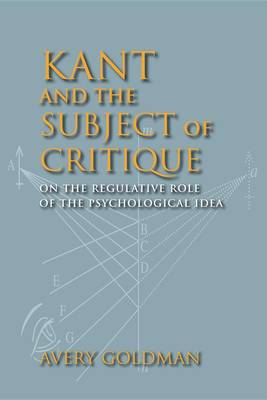
- Afhalen na 1 uur in een winkel met voorraad
- Gratis thuislevering in België vanaf € 30
- Ruim aanbod met 7 miljoen producten
- Afhalen na 1 uur in een winkel met voorraad
- Gratis thuislevering in België vanaf € 30
- Ruim aanbod met 7 miljoen producten
Omschrijving
Immanuel Kant is strict about the limits of self-knowledge: our inner sense gives us only appearances, never the reality, of ourselves. Kant may seem to begin his inquiries with an uncritical conception of cognitive limits, but in Kant and the Subject of Critique, Avery Goldman argues that, even for Kant, a reflective act must take place before any judgment occurs. Building on Kant's metaphysics, which uses the soul, the world, and God as regulative principles, Goldman demonstrates how Kant can open doors to reflection, analysis, language, sensibility, and understanding. By establishing a regulative self, Goldman offers a way to bring unity to the subject through Kant's seemingly circular reasoning, allowing for critique and, ultimately, knowledge.
Specificaties
Betrokkenen
- Auteur(s):
- Uitgeverij:
Inhoud
- Aantal bladzijden:
- 264
- Taal:
- Engels
- Reeks:
Eigenschappen
- Productcode (EAN):
- 9780253223661
- Verschijningsdatum:
- 2/03/2012
- Uitvoering:
- Paperback
- Formaat:
- Trade paperback (VS)
- Afmetingen:
- 152 mm x 226 mm
- Gewicht:
- 430 g

Alleen bij Standaard Boekhandel
Beoordelingen
We publiceren alleen reviews die voldoen aan de voorwaarden voor reviews. Bekijk onze voorwaarden voor reviews.











